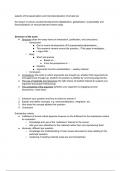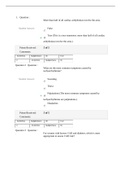Samenvatting
Summary Advanced Private Law (Final Exam summary)
- Instelling
- Universiteit Van Amsterdam (UvA)
This document contains all relevant weeks from 1-7 and its content, including reading notes and case law as well as tutorial and lecture notes. the content is as follows: 1. Materialisation of private law 2. Europeanisation of private law 3. constitutionalisation of private law 4. Sustai...
[Meer zien]










